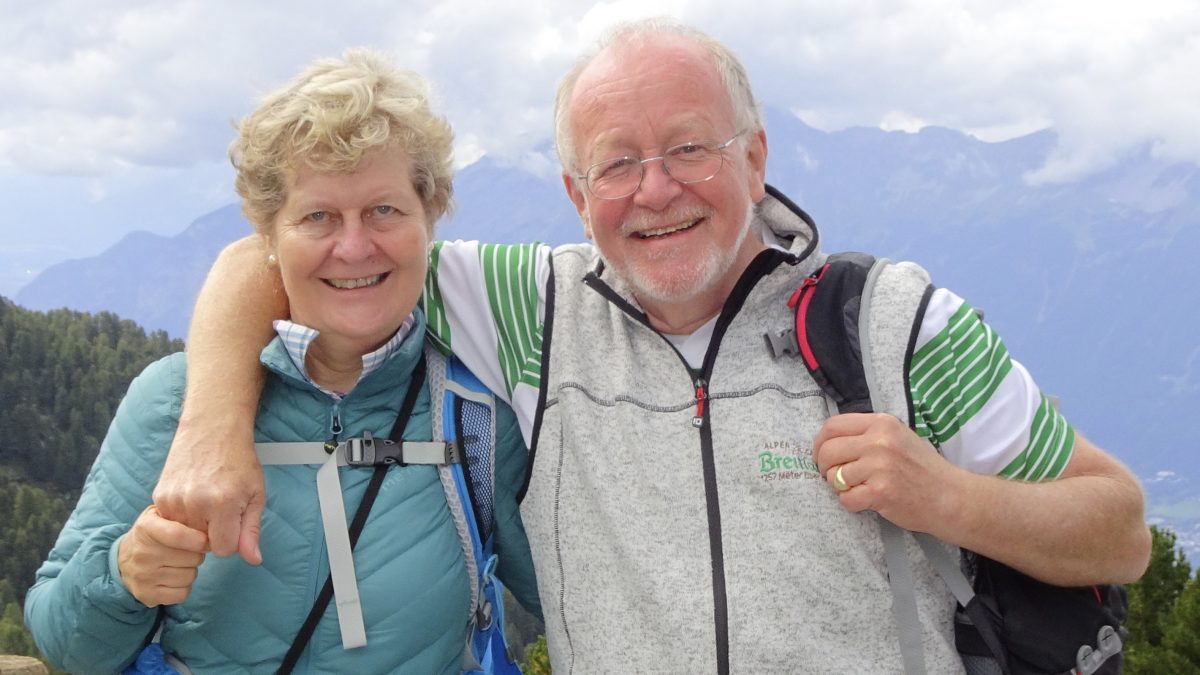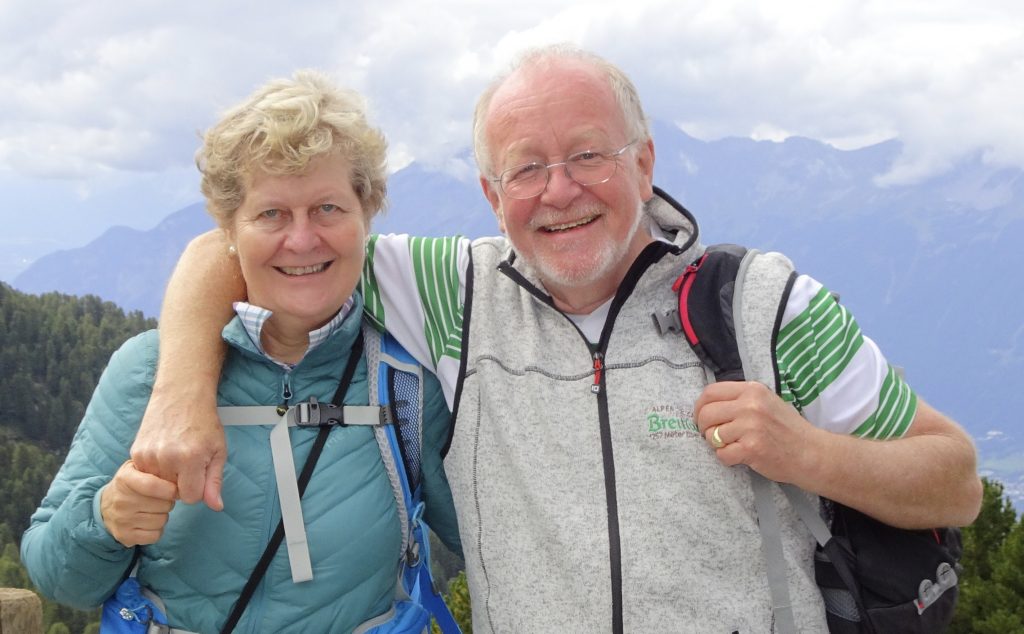106,2 MHz Völs bis Telfs
89,6 MHz Hall bis Schwaz

©Sandra and Andrew Milne-Skinner
Radiomacher*innen
Sandra and Andrew Milne-Skinner

Andrew first got involved with FREIRAD some years ago, when he took part in the innovative project ‘Radio Enterbach’ in our home village of Inzing. He offered two programmes, one on the Scottish language and the other on Eleanor of Scotland and her links with the Tyrol.
When he retired, he was looking for a new outlet for his creative energies and we started our first programme, Poetry Café, in which, for 52 minutes twice a month, we read poems and poetic prose and play complementary music.
When we first started with Poetry Café, Andrew didn’t think it was necessary to have a script. He felt that he had all the information he needed in his head and he was used in his lecturing career to talking without a detailed script. We were to record our first programme live. Luckily, I decided I needed to practice using the recording equipment, so we booked a trial session in advance. After three minutes recording, Andrew dried up! Speaking into a microphone is far more difficult than lecturing to a class.
We went home and spent the whole evening preparing a script. We also decided that, in future, we would record our programmes in advance, rather than broadcast live. Having a script helps us to deliver a programme within strict time limits, and also allows us to check that we have covered all aspects of the topic. We always have a full script, but may add a few unscripted comments when recording.
We have now completed 150 Poetry Café programmes on a wide range of topics. For example, we have produced programmes on poets and musicians, and on current affairs. Sometimes we feature a season of the year, or, if we have been travelling, we feature countries or areas we have visited.
Once we have decided on a Poetry Café topic, we carry out research. Andrew has such a good library that he often relies on it alone. Sandra is more likely also to use the Internet, and from time to time Andrew also appreciates the nuggets of information she can discover for him while searching the web. We search for poetry and poetic prose related to the topic, and also for background information. We also look for music that reflects the theme or that links directly to the poems or prose we are reading. We use cassettes, LPs and CDs from Andrew’s collection, but also use the Internet for more unusual pieces of music. It’s a great feeling when you find a piece of music that exactly fits your topic!
We don’t always know a lot about our topics, so for us it can be a fascinating journey of discovery. We spend at least two days doing the research. When we base programmes on places we have visited on holiday, we are always thinking about potential topics and looking for material during the holiday.
Our second programme, Reading Circle, broadcast once a month, was a product of the private English Language Reading Circle we set up about 10 years ago.
Each month we meet up with a group of people interested in English literature and discuss a book. Now, after each meeting of the Reading Circle, we record a 59-minute programme in which we either introduce or discuss the book we have read that month and play complementary music. Titles have ranged from Colson Whitehead’s ‘The Underground Railroad’ to Philippe Sand’s ‘The Rat Line’ and Meriel Schindler’s ‘The Lost Café Schindler’.
When we have members of the Reading Circle in the studio with us we prepare a programme outline and decide what readings from the book to use, and who will read them. We identify the book’s themes, key characters and construction. We also collect a number of reviews to quote.
When recording we start with an outline of the plot and then work through the topics on the programme outline. We also report on what members said about the book at the Reading Circle meeting, and discuss our views on the book.
When it is only the two of us in the studio we prepare a full script, covering the topics noted above. In both cases we also research relevant music, either because it is quoted in the book or because it comes from the same place and/or period in which the action takes place. In both cases we say whether we would recommend the book to listeners, and why.
Being part of a Reading Circle with a wide variety of people with different tastes and interests means that we end up reading books we would never have discovered on our own. It also means that we can share this rich variety with our listeners, and encourage them to read the books too.
It’s always satisfying when we have recorded a programme and edited it – we can go home happy that we have tried at least to do our best. Of course, over the years we have benefitted from a good deal of training and support from FREIRAD staff, starting with Geli, through Anna, Klaus, Meral and now the current FREIRAD team. Without them we would not have been able to deliver our programmes.
FREIRAD allows people from different backgrounds and cultures to offer programmes in their own language and thus makes a significant contribution to culture and diversity in the Tyrol.
Poetry Cafe
has been on air since June 2014.
When:
every 2nd thursday of the month from 1:06 p.m. until 2 p.m.
and as repetition every 3rd friday from 11:06 a.m. until 12 p.m.



